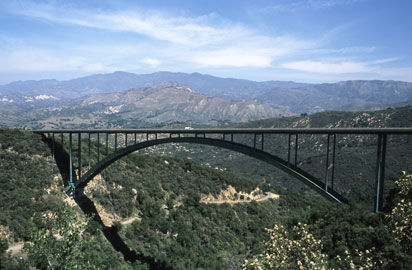Suicide Barrier Gets Green Light
Judge Rules in Favor of Caltrans

A decision by Judge Thomas Anderle Tuesday morning opens the door for construction to begin anew on a suicide barrier on the Cold Spring Canyon Bridge. The judge had halted construction of fencing on either side of the historic structure — the site of at least 55 suicide leaps since its construction in 1963 — in July after a group, Friends of the Bridge, successfully argued that the Environmental Impact Report (EIR) done by Caltrans didn’t conform to the rules of the California Environmental Quality Act (CEQA). For the last several months, Caltrans has been recirculating an EIR with further analysis. That EIR and project were reapproved on April 18.
This time around, Friends of the Bridge — led by lawyer and retired UCSB professor Marc McGinnes — argued that Caltrans had again violated CEQA by refusing to consider a horizontal alternative (a safety net) that would’ve preserved the view from the bridge out into the Santa Ynez Valley. But part of Caltrans’s rationale (which was adopted by the judge) in asking that the project be allowed to move forward was that the issue should have been raised earlier, as the argument was not part of the original petition from Friends of the Bridge. Additionally, and more importantly, the judge questioned whether the safety-net alternative would’ve reduced the number of suicides from the bridge, and suggested the net would’ve increased hazards to rescue personnel.
So the project will move forward with the original nine-foot, seven-inch-tall fencing that Caltrans had begun to install last summer, the result of several years of deliberation, study, and scrutiny by the community. The project has the support of the majority of area politicians, as well as the Sheriff’s Department, CHP, and mental-health advocates. “We’ve always said we’d see this project to completion,” said Caltrans spokesperson Jim Shivers outside the courtroom. Shivers said the construction costs sit at about $750,000, and the project will take less than six months once it gets underway. Marc Chytilo, attorney for Friends of the Bridge, said the group would take a closer look at Anderle’s ruling and decide how to proceed. Future lawsuits or appeals are possible. He said that Caltrans might have reached the right decision, but that the road taken was wrong. “It’s very disappointing Caltrans didn’t try harder,” Chytilo said.



